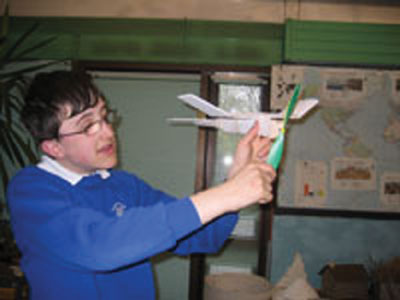| 2006 |

|
YEAR BOOK |
Department of Education, Northern Ireland
|
Science education in Northern Ireland schools and colleges
|

W5, the interactive discovery centre in Belfast
W5 excels at meeting the challenge of keeping science relevant and interesting for pupils of all ages. Schools from all parts of the island of Ireland and from Scotland regularly visit W5. Over the last year the staff have been building up their skills in presenting topical issues to pupils attending post-primary schools. Last year, funded by the Wellcome Trust, they delivered workshops on genetic testing and stem cell research with the assistance of Dr Fiona Stewart, Genetic Consultant at the Belfast City Hospital. Other issues-based workshops and talks on topics such as climate change, nanotechnology and vaccination are in the pipeline; important skills such as communication are being developed with key professionals, showing their relevance in the workplace.
Sharing Science Across Ireland (SSAI)
SSAI is a successful Peace II funded, Association for Science Education and Irish Science Teachers Association project involving 52 primary and 29 post-primary schools from NI and the 6 border counties of the Republic of Ireland, working in clusters of 3-5, each having cross-community and cross-border representation. The schools have worked together on science teaching activities and exhibitions on topics such as healthy eating, energy, recycling, thinking skills, captivating starts to lessons, creative practical work and environmental topics. Lasting links between schools have been developed together with more interesting, creative, exciting and fun approaches to science learning. Although the project ends in 2006, co-operation will continue informally and through the Chalkbytes website.
Primary science
Around 200 primary children from 20 schools across Northern Ireland "connected" with the world of science when they presented the results of their own research at Queen's University in May 2006. A special live linkup with schools in South Africa was arranged in collaboration with the "Sharing Science across Ireland" and "Chalkbytes" projects. The Primary ConneXions event gave the young researchers the chance to present the findings from their scientific projects to each other and to an invited audience of scientists, engineers and educationalists. This year's theme, 'Seeing Science', encouraged the young people to understand the relevance of science in everyday life. The judges were amazed by the diversity of school projects being presented and the level of engagement with the South African pupils was such that it was as if the presenters and those asking questions were all in the same room. The young participants studied a range of subjects, such as insect life in ponds, aircraft noise, climbing frame construction and alternative energy, including the conversion of cow manure to fuel. The South African schools studied water pumping systems and steam trains on their local railways. The live link brought an international aspect to the project and helped young people understand a culture different from their own.
Cross border co-operation continues with W5 being one of the Centres for Discover Primary Science, a flagship project run by the Discover Science & Engineering (DSE) awareness programme. DSE is managed by Forf�s on behalf of the Office of Science & Technology at the Department of Enterprise Trade & Employment. The programme aims to develop children's creativity and demonstrate how important science is in everyday life, and how much fun it can be!
The Rolls-Royce Science Prize
The Rolls-Royce Science Prize was launched in July 2004 and is open to every school and college in the UK and Republic of Ireland catering for pupils aged from 3 to 19 years. Awards are presented to teams of adults, led by practising teachers, who can create inspiring and sustainable teaching proposals that address a specific need in their school or college. The nine finalists emerged from a field of 622 schools and colleges that registered for the prize in the six months up to February 2005. By sharing examples of innovation and expertise demonstrated by the teams, the Rolls-Royce Science Prize contributes to the continuing professional development of science teachers. Teams from Loreto College, Cavan and Fleming Fulton School, a Belfast school for children with special needs, reached the final.The Belfast team developed an excellent series of lessons based on the view of aliens visiting Earth for the first time and how they would learn about science through their exploration. Both schools gained much from participating in the competition, their professional expertise and confidence increased considerably and strong links with other local schools were established.
Links between science education and knowledge economy in NI
A key government objective in NI is to improve economic prosperity through encouraging new businesses, particularly on the field of the knowledge economy. In order for NI to build upon the intellectual capital of its young people there is a need for a better understanding of employment opportunities in science/technology-based industry. Groups of key business leaders and science educators have met on a number of occasions in the year under review to consider ways of attracting more young people into the challenging and attractive careers in the field.
Contact: Irvine Richardson,
Department of Education,
Northern Ireland,
Rathgael House,
43 Balloo Road,Bangor.Co Down. BT19 7PR
E-mail: irvine.richardson @deni.gov.uk